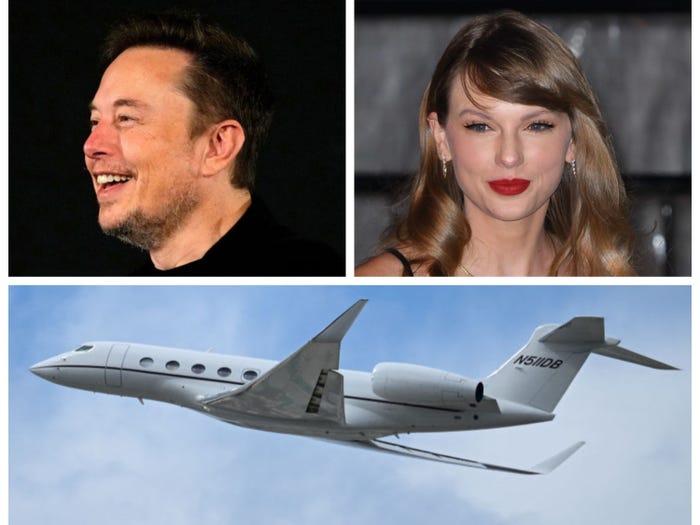Celebrities like Elon Musk and Taylor Swift might soon be able to hide their private jet flights from online sleuths

An icon in the shape of an angle pointing down.
Getty Images
- President Biden passed a law allowing private aircraft owners to further cloak their travels
- The new law would expand on the FAA’s already-in-place efforts to reduce jet tracking.
- People have taken to tracking Elon Musk and Taylor Swift’s jets over the past few years.
The days of celebrity jet-tracking might be nearing an end.
Tucked away in the 1,100-page FAA reauthorization, signed into law by President Joe Biden on May 16, is a section on data privacy that would allow private aircraft owners to further cloak their travels.
The language calls for the FAA to set up a system that would allow private plane owners to request their data be withheld from public sites, fly under a temporary registration number to obscure their flight data, and block “similar identifiable data or information, except physical marking required by law” from public dissemination.
Currently, private jet owners like Elon Musk and Taylor Swift can opt for two federal programs: the Limiting Aircraft Data Displayed, or LADD, list, and the Privacy ICAO address, or PIA, to help shadow their aircraft from public view.
However, the new law appears to allow PIA applicants to travel internationally, while owners had previously been required to swap out their PIA code when traveling outside the US. It could also potentially further reduce the number of identifying characteristics that would be publicly available regarding the users’ aircraft and flight information, though it’s unclear what that would look like.
Jet-tracking mogul and college student Jack Sweeney, who rose to fame after Musk offered him $5,000 to stop tracking his private plane and posting its movements online, says the new law may not fully disguise private aircraft.
“Let this be said that this doesn’t prevent us from tracking jets,” he said on X shortly after the bill was passed by Congress. “We can still figure out who’s who via context clues.”
Prior to the law’s passing, the LADD and PIA programs were used by myriad businesspeople and celebrities to cloak their travels, but they weren’t a silver bullet.
LADD and PIA prevented an owner’s flight information from showing up on websites that use FAA data, like FlightAware or FlightRadar24, but the information can be found via third parties.
For example, publicly available software like ADS-B Exchange, which uses volunteer radios to track things like altitude and airspeed, and context clues mean the FAA programs can’t prevent all jet tracking.
“Elon Musk, for example, has a Gulfstream, and there’s only so many people that fly that particular plane out of Brownsville, Texas, and fly to the same airports,” Sweeney, who is still running celebrity jet-tracking accounts on social media, told Business Insider in 2022.
An FAA spokesperson said the agency “will comply with the requirements in the legislation.”
Mark Dombroff, a partner and aviation attorney at Fox Rothschild LLP and a former FAA lawyer, told Business Insider that the law is a sign that the government is finally responding to the security concerns celebrities like Musk have been dealing with over the past few years.
“Congress is basically giving the FAA a mandate around the level of safety they want to be able to achieve,” Dumbroff said. “It’s up to the FAA to find the means to reach that end result.”
“I think what really has to happen is the availability of the information and the manner in which it’s being used needs to be fine-tuned,” he added.
